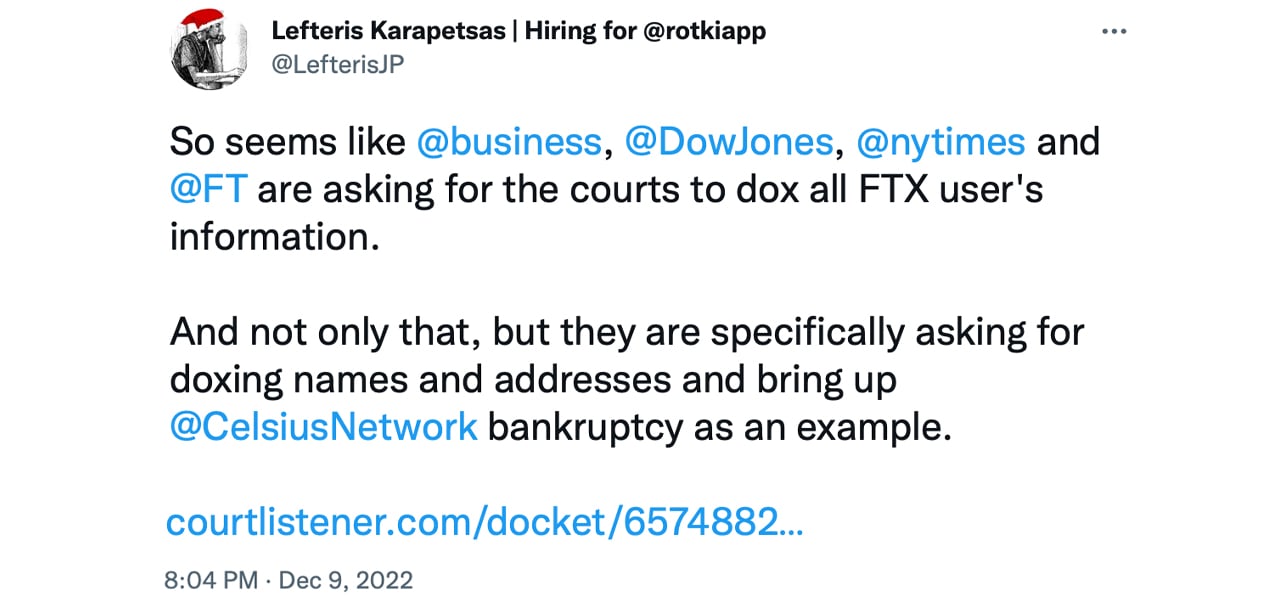
Amid the ongoing FTX bankruptcy proceedings, court documents indicate that media firms such as Bloomberg, the New York Times (NYT), Dow Jones & Company, and the Financial Times (FT) want the redacted information tied to FTX creditors unsealed. The media companies believe the public should be made aware of the creditors’ information, as the publications stressed in the court filing that the “news media acts as the eyes and ears of the public.”
So-Called ‘Media Intervenors’ Insist the Court Should Unseal FTX’s Creditor Information
Four major news media publications have filed a document with the Chapter 11 bankruptcy case tied to the now-defunct FTX cryptocurrency exchange. Essentially, the publications call themselves “media intervenors” and the intervenors “object to the continued sealing and redaction of information that historically has been quintessentially public in nature.” The four media outlets include the Financial Times (FT), the New York Times (NYT), Bloomberg, and Dow Jones & Company.

The so-called “media intervenors” cite a specific rule that permits “any interested entity” to intervene in a bankruptcy matter and “with respect to any specified matter.” The publications also says that the courts have “routinely recognized the right of the media” to “intervene” or “challenge sealing orders.” The filing adds:
The news media acts as the eyes and ears of the public, informing the public of issues of the day. This valuable social function is hampered by sealing of judicial records.
Despite the debtor’s objections to keep the customer list in strict confidence, and the reasoning that says the dissemination of the debtors’ customer list could cause harm to the clients, the “media intervenors” call these arguments “vague statements” that “do not appear to satisfy the evidentiary burden.” Bloomberg, FT, NYT, and the Dow media firms insist that “redacting the names of creditors is inappropriate.” The court filing continues:
While redaction of contact information arguably may be justified in some circumstances to prevent identity theft and harassment, releasing the names of the creditors neither exposes the creditors to risk of identity theft nor to personal danger. It also does not create undue risk of unlawful injury.
Additionally, the Celsius bankruptcy case is highlighted by the media firms in the court filing. In that specific case, the bankruptcy court published 14,000 pages of Celsius customer usernames and trade histories. After the court did this to Celsius users, it caused quite a bit of public outcry. “This Celsius dox is one of the [most] egregious privacy violations in crypto history,” one individual wrote at the time. The news also follows the public denouncing mainstream media publications on several occasions for doxxing people.
From Dorian Nakamoto to Libs of Tiktok, Media Doxxing Moves Beyond Internet Culture and Becomes the Industry’s Choice Tool
In recent times, the Washington Post’s reporter, Taylor Lorenz, was blasted in mid-April for reportedly doxxing the Libs of Tiktok creator. Four years ago mainstream media publications like the NYT said that doxxing has become “a mainstream tool in the culture wars.” The report notes that “identifying extremist activists and revealing their personal information has become a bit of a sport on the internet.”
Years later, the establishment’s media has been accused of leveraging the doxxing tool and using the controversial tool for clicks, publicity, and notoriety. When Newsweek columnist Leah McGrath Goodman published a report in March 2014, the reporter was slammed for doxxing Dorian Nakamoto’s California address. It was found that Dorian was not Satoshi Nakamoto and he said the reporter treated him unfairly.
As far as the FTX bankruptcy case is concerned, Redditors from the forum r/cryptocurrency lambasted Bloomberg, FT, NYT, and the Dow media firms for attempting to dox customers associated with the fallen exchange. In the forum discussion, Redditors also talked about how a number of publications like the New York Times published puff pieces on the FTX co-founder Sam Bankman-Fried.
“Never expected anything better by the media. It’s just all about the money for them and 0% about the truth,” one individual wrote. “Sadly way too many still trust them.” Another person added:
Mainstream media are paid actors.
Despite the most recent public outcry against the Celsius dox, the so-called “media intervenors” do not mention that part of the story, even though it was quite evident the public was not pleased with the bankruptcy court’s decision.
“Redacting the names of the creditors will have far-reaching impact as the case progresses,” the media publications note in the FTX bankruptcy court filing. “This court has routinely authorized debtors in other Chapter 11 cases to file under seal confidential information,” the filing concludes.
What do you think about Bloomberg, FT, NYT, and the Dow media firms attempting to get FTX’s creditors’ list unredacted? Let us know what you think about this subject in the comments section below.
via Jamie Redman

0 comments:
Post a Comment